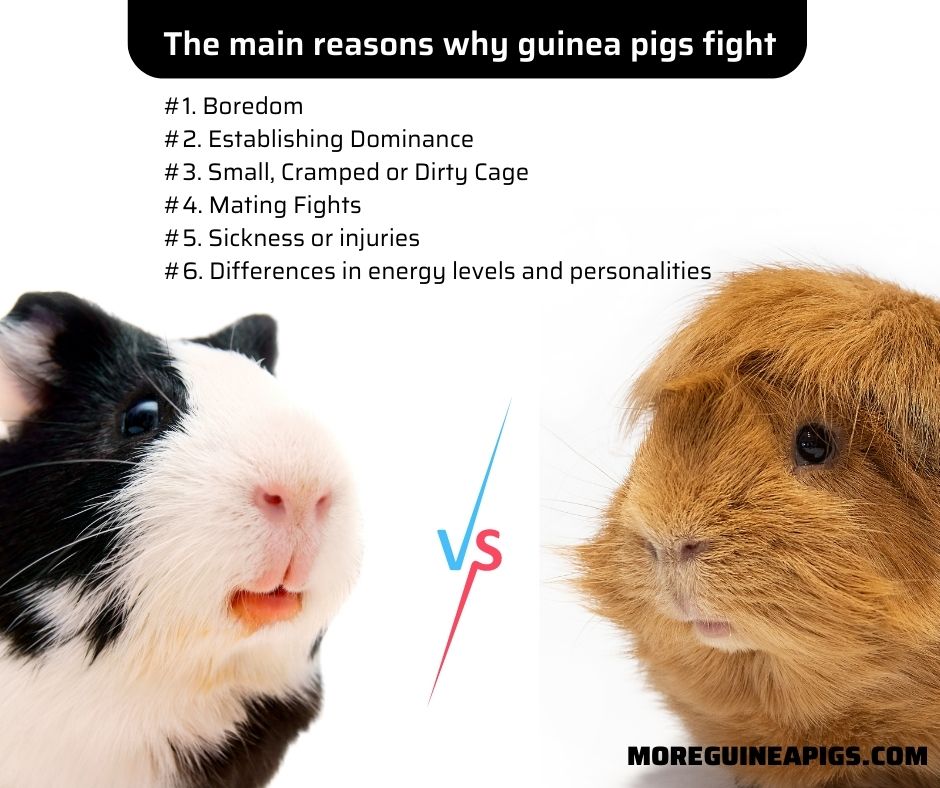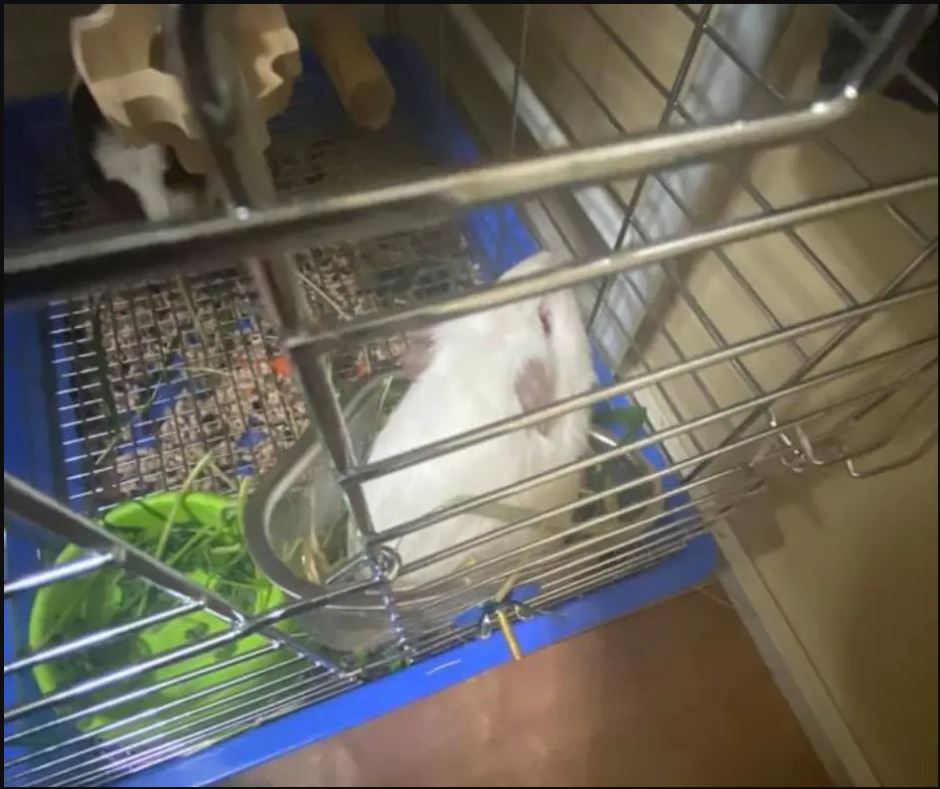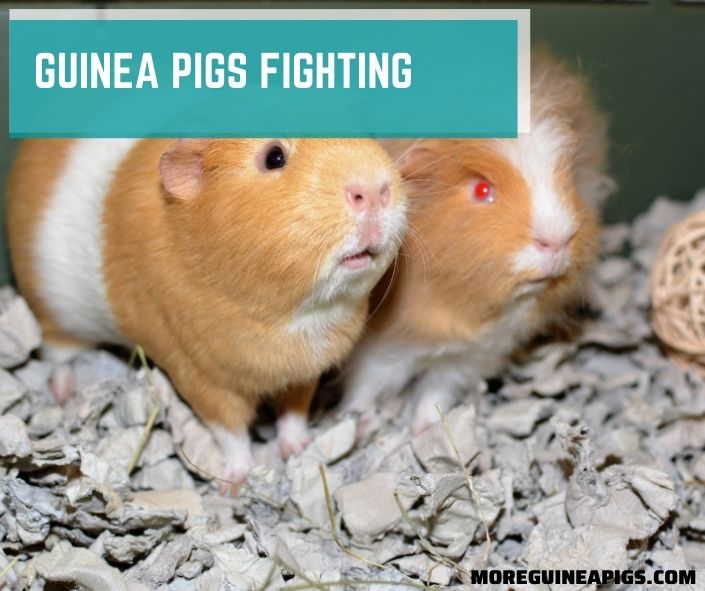Guinea Pigs Fighting: Causes and How to Deal with It!
Having a guinea pig is a big responsibility. Having two is even bigger!
If your guinea pigs are fighting all the time, it can be very distressing. It can also be dangerous because they could end up hurting each other.
So, before things come to that, it is important that you intervene.
In this guide, we will tell you exactly why cavies fight sometimes and also, more importantly, how to stop it.
Why Are Your Guinea Pigs Fighting? (Short Answer)
There are many reasons why guinea pigs will fight.
Throw in two male cavies inside a small cage, and you have a recipe for disaster. Very small cages will have your cavies competing for space and resources. This is one of the most common causes of bickering in piggies.
Two female guinea pigs will generally get along well since they are docile. However, boredom can sometimes lead to fights and arguments even in the fairer sex. Also, most guinea pigs fight to establish dominance and authority.
It is important that, as a guinea pig owner, you know what real fighting looks like. Because sometimes, your guinea pigs may simply chase each playfully and that isn’t fighting at all.
Fighting can include violent biting and even bloodshed. Here are some other signs:
- Growling, hissing, lunging at each other
- Chattering teeth and whining sounds
- Preventing the other pig from eating or drinking.
Also read: 11 Common Guinea Pig Noises and Their Meaning
Why Are Your Guinea Pigs Fighting? (Long Answer)

The main reasons why guinea pigs fight are as follows:
#1. Boredom
A bored guinea pig will constantly pick fights with its cage-mate/s. It may not be getting adequate exercise and that could make it uneasy. This can lead to many negative behaviors including fighting, bickering, crankiness, etc.
#2. Establishing Dominance
If you throw in an older and younger guinea pig together, the older will try and establish dominance. Later on, you will see the same show of dominance from the younger piggy as it grows and becomes stronger.
Even two males or two females housed in the same cage will show this type of fighting. Here are the signs that a guinea pig is trying to establish dominance:
- Chasing each other – typically seen in female guinea pigs
- Holding head and dancing
- The dominant pig might attack the other pig – usually sniffing the butt at the same time.
- The dominant piggy will even mount the other pig until it shows signs of submission.
#3. Small, Cramped or Dirty Cage
According to the Humane Society, most commercial cages for guinea pigs are too small. When you house two male or two female pigs in a small cage, they are bound to fight for space and resources.
The experts at the Humane Society recommend a cage that is at least 10.5 square feet (30” x 50”) for two pigs.
However, most people buy cages that are only about 7.5 sq. ft. These small cramped quarters simply don’t have enough room for your piggies to play and explore.
This can cause competition and boredom which could lead to fights and displays of aggression.
Also read: Top 5 Guinea Pig Cages & 7 Factors To Make Perfect Enclosure

#4. Mating Fights
Two guinea pigs of the opposite sex might also fight if they paired incorrectly. For example, if you have two males and one female in the same cage, the two males will fight to establish dominance and win the mate.
Often, the poor female pig could get injured in the fights between two males.
Similarly, if two guinea pigs of the opposite sex are housed together but have different personalities, then they could fight and bicker.
#5. Sickness or injuries
Guinea pigs can get aggressive if they are in pain which can come on due to a sickness or injury.
If two guinea pigs have been living amicably and harmoniously for ages but one of them suddenly starts aggressively attacking the other, then chances are that it is not well.
Watch out for other signs of illness such as lack of appetite, increased hunger, diarrhea, etc.
If you see these signs, take your pet to the vet right away.
Also read: Guinea Pig Diarrhea: Signs, Cause, Treatment and Prevent
#6. Differences in energy levels and personalities
Different breeds of guinea pigs have different personalities. Some are shy, calm, timid, and low-energy. Examples include the American and English guinea pigs.
On the other hand, breeds like the Abyssinian guinea pigs – often used in shows – are highly energetic. If you house these different breeds together, chances are that one cavy prefers peace and quiet while the other one gets the zoomies!
These personality and energy differences can also lead to fights, shows of dominance, and aggression. That is why it is best to house cavies only after carefully evaluating their natures and temperament.
Guinea Pigs Fighting? What Should You Do?
When you house guinea pigs together, there will be a show of dominance in the beginning.
Usually, this is seen in adolescent pigs aged 3-5 months. Most pigs will settle down after this period and become good pals.
You can wonder: Should I separate my guinea pigs if they are fighting? Sometimes, adding a partition such as cardboard inside the cage can help familiarize the two pigs while preventing them from hurting each other.
This way, they can smell each other but not hurt or fight with each other.
Here are a few tips as to what you ought to do if your piggies fight:
Give them Some Time
Before you rush off to buy a new cage, wait.
Observe your cavies for a few days. Guinea pigs are generally social, playful animals. With time, they will calm down. Allow them to solve their differences on their own. Fights for dominance usually go on for 2-3 days.
Separate them for a Short Period Before Reintroducing Them
Sometimes, simply separating your cavies for a night or two can do the trick. This will give your buddies some cooling off period and also they may view each other differently once they are well-fed and well-rested.
Gradually reintroduce them over the next few days. Make sure you monitor them from time to time. (If you work out of home, have someone over to watch them or install a camera, so you can ensure your pets’ wellbeing.)
If they Continue to Fight
In case your cavies do not cool off, if one pig is constantly preventing the other from eating or drinking, or their fights lead to bloodshed, then it may be best to separate them.

Can Guinea Pigs Kill Each Other?
Most domesticated breeds of guinea pigs are calm and social animals. Two guinea pigs of the same or similar size usually won’t be able to kill each other.
Also, if a fight does break out between your two cavies but you intervene at the right time, then you can prevent one piggy from hurting or seriously injuring the other.
However, in your absence, it is possible that a larger, older, or more aggressive guinea pig that has the intent to kill could easily kill a smaller or younger pig.
Do Guinea Pigs Attack or Eat Their Babies?
Guinea pigs are herbivores and usually do not eat other pigs especially their babies.
However, rare cases have occurred where a young sow ate her babies after giving birth.
Here are possible reasons why a guinea pig might eat its babies:
- The sow was trying to open the amniotic sac but ended up accidentally killing the baby.
- The baby/babies would not have lived anyway. They were stillborn.
- The mother was exceptionally hungry so she ate her very young baby- especially the parts around their heads.
Please speak to your vet regarding this.
What is the Best Way to Stop Guinea Pigs Fighting?
There are a number of things you can do to stop your guinea pigs from fighting. Keep an eye on your pets and intervene the moment you see the fight getting ugly.
Remember: not all fights are fights – your pets may be just being playful.
However, if you are convinced that your cavies just aren’t getting along, then here are some steps you can take:
#1. Keep Eye for Signs of Anger and Fight
If you have recently housed two cavies together, observe them closely, at least for a week. Make sure there is peace and harmony.
Ensure that both piggies are eating well. Look out for signs like biting, stopping each other from reaching the food, or other forms of aggression and passive aggression.
#2. Provide Enough Food
Each guinea pig needs to eat hay daily. Provide each pig with a pile of hay as big as its body. If possible, keep the food separate.
This will ensure that both pigs get their own food and can eat in peace. Provide separate cups of vegetables and individual toys and treats.
Also read: What Can Guinea Pigs Eat? A-Z Food List
#3. Give Enough Space or Divide Up The Cage
A cage for two pigs should be at least 10.5 square feet or 30” x 50”. If needed, add a large cardboard piece to separate the two pigs. However, your goal must be to eventually remove the divider.
Guinea Habitat Guinea Pig Cage by Midwest
#4. Make the Cage Enjoyable
Boredom is often one of the main reasons why two pigs turn on each other. Make the cage more interesting – just like a natural habitat is for cavies in the wild.
- Add in some tunnels, hiding spaces, hammocks, and climbing areas in the cage.
- Keep plenty of chew toys for your pigs – they will keep your cavies occupied.
- Strategically locate your piggies’ food in the cage so they can get some exercise when they search for it.
- Simple things like paper to tear up, rope toys, and mirrors can also keep your fur babies active and happy.
Also read:
#5. Clean Up The Cage Often
A dirty, smelly cage can also irritate your guinea pigs. Worse, it can invite diseases that could make your pigs cranky and grumpy.
Clean the cage regularly by removing all moldy hay, leftover food bits, and wet bedding.
A clean cage will also reduce the scents that guinea pigs use to establish dominance.
Also read: How To Clean a Guinea Pig Cage?
#6. Be Careful When Introducing a New Mate
If you’re planning to introduce two guinea pigs of the opposite sex to each other, do so gradually.
- First of all, have your vet examine both. You do not want to breed sick or diseased cavies.
- Remember: breeding can be dangerous as many pigs die after giving birth. So do not do it just for fun.
- If you’re breeding a guinea pig with another pig from outside, follow a quarantine period of isolation. This is important to prevent diseases.
- Allow some time for the two to interact in the cage that the sow is familiar with. If a sow is not ready for breeding, she might show signs of aggression like baring her teeth or growling.
- If you house several sows together, remove the ones you are not breeding, from the cage.
- Maintain companionship between the two animals and allow them plenty of floor time.
- When the sow comes in heat, leave the pair undisturbed. Sometimes, it can take several heat cycles for the pregnancy to occur. So be patient.
Also read: Do Guinea Pigs Need Cage Mates? 4 Steps to Introduce New Guinea Pigs
Conclusion Guinea Pigs Fighting
If your guinea pigs are fighting, there can be several reasons behind it: small cage, boredom, to establish authority, inadequate food, injury, illness, etc.
Evaluate the reason behind the fighting so you can take the necessary steps to prevent it.
We hope this guide helps you create a peaceful environment for your tiny pets.







